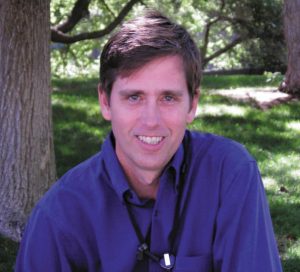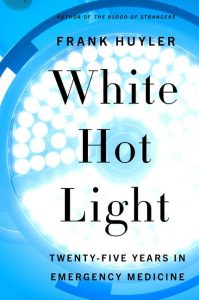The PEN Ten is PEN America’s weekly interview series. This week, Jared Jackson speaks with Frank Huyler, author of White Hot Light: Twenty-Five Years in Emergency Medicine (HarperCollins, 2020).
 1. What was the first book or piece of writing that had a profound impact on you?
1. What was the first book or piece of writing that had a profound impact on you?
I read a great deal as a kid. I probably spent more time reading than anything else, nerd that I am. But the first books that I remember making a different sort of impression on me than the usual fare were Jack London’s The Call of the Wild and White Fang. I think I was about 10 years old, but they had a powerful impact—possibly for wrong reasons—since they’re both pretty brutal books.
2. What does your creative process look like? How do you maintain momentum and remain inspired?
My creative process looks like months to years of indolence followed by occasional bursts of obsessive work. I’ve always admired people who have the discipline to write every day, but I have to wait for a project to come with some sense of internal urgency, or else I just can’t do it. Both momentum and inspiration are constant struggles for me.
“The COVID-19 pandemic has illuminated the censorship of free expression like few other recent events. Both governments and institutions around the world have reacted in similar and often authoritarian ways, reflexively moving toward the suppression of information rather than transparency. ”
3. What is one book or piece of writing you love that readers might not know about?
One my absolute favorite books is a novella—J.L. Carr’s A Month in the Country. To me, it is an absolute masterpiece, just a beautiful book in every way. Many, many more people should know about it. If anyone reading this interview discovers this book as a result, I will be happy.
4. What is the last book you read? What are you reading next?
The last book I read was In a Strange Room by Damon Galgut, who is a wonderful writer. The book I’m currently reading is In Another Country, a story collection by another fantastic writer, David Constantine. I’m reading it slowly though, because to be honest, it’s hard to concentrate these days.
5. What do you consider to be the biggest threat to free expression today? Have there been times when your right to free expression has been challenged?
I think free expression is under increasing threat. People are being fired and otherwise censored for posts on social media, blogs, and so on. Written opinions can be surveilled like never before. Many corporations seek to limit and punish free expression by their employees if it reflects poorly on the corporation, even indirectly. The proliferation of legally binding nondisclosure agreements is an example of this. Google, as another example, overtly protects large companies from critical reviews by employees or former employees, but does not offer similar protection to individuals or small businesses, who have no recourse. More generally, there seems to be a growing cultural intolerance for the expression of unpopular or controversial opinions of all kinds, which is always the real test of free speech. These are very dangerous trends.
The COVID-19 pandemic has illuminated the censorship of free expression like few other recent events. Both governments and institutions around the world have reacted in similar and often authoritarian ways, reflexively moving toward the suppression of information rather than transparency.
“People tell stories like dogs wag their tails—they are genetically compelled to do so. I think storytelling, like language, has a biological basis. In a sense, it’s an act of the collective mind, and a uniting force. The synthesis of experience encourages the power of prediction, of anticipation, and the ability to learn from the choices and wisdom of others over time.”
6. What advice do you have for young writers?
Do it because you love it, and find something else to pay the bills. With very few exceptions, nobody makes a living as a writer alone. This has never been more true. I think it is a mistake, in general, to try and make one’s living as a writer, however peripherally, such as through teaching—unless you genuinely like teaching—which of course has great independent worth. You can do anything and still be a writer, and will be a better writer because of it in the end. Don’t take on debt that you will struggle to pay back to get an MFA, either. It is not worth it.
7. Why do you think people need stories?
My view is that people tell stories like dogs wag their tails—they are genetically compelled to do so. I think storytelling, like language, has a biological basis. In a sense, it’s an act of the collective mind, and a uniting force. The synthesis of experience encourages the power of prediction, of anticipation, and the ability to learn from the choices and wisdom of others over time. All of these qualities had direct relevance to survival in the ancient past, and arguably today as well. Human beings do not live as solitary individuals like tigers, but rather—they live in bands working together. Without this collectivism, we would not have risen as a species. I don’t think it’s an exaggeration to argue that storytelling has played a significant role in human evolution.
Of course, stories are often deceptive as well. They are not the truth. Instead, they are an imposition of order where order may not, in fact exist. People crave order because an orderly world is one we can reason our way through. Order empowers us and comforts us—it implies that meaning can be found and lessons can be learned.
Stories also have the power to invest knowledge with emotion, and emotional responses are markers of particular significance for human beings. We remember what we feel most of all. So, stories teach us, but they also allow us to deceive ourselves, and to find comfort in the deception.
 8. Your book White Hot Light is a collection of essays based on your perspective as a doctor in the ER. It’s a follow-up to your book The Blood of Strangers: Stories from Emergency Medicine. What made you want to revisit writing about experiences in the ER? What has changed, in your writing and as a doctor, in the 20 years between these two personal and vulnerable books?
8. Your book White Hot Light is a collection of essays based on your perspective as a doctor in the ER. It’s a follow-up to your book The Blood of Strangers: Stories from Emergency Medicine. What made you want to revisit writing about experiences in the ER? What has changed, in your writing and as a doctor, in the 20 years between these two personal and vulnerable books?
Well, you hope that as you get older, you learn things and see more clearly. You hope that you gain something from the passage of time. This was really the question I began with in this book—ok, 25 years have passed, what have you learned?
I knew, certainly, that I’ve changed, as all of us do. I knew that my take on the world of medicine would be different, but I wasn’t exactly sure how the distinctions would reveal themselves. So I suppose writing the book was in itself an exploration, an attempt to look at both the world and my own life from midlife instead of youth.
In the end, for me, medicine as a subject is more of a vehicle than anything else. My intention in this book was ultimately to look beyond medicine, perhaps as a novelist would do, at themes that apply more generally to everyone. Memoir is tricky, in that it is inevitably self-absorbed, but at its best it looks outward as a form rather than inward. This, at least, is what I was trying to do here.
“Where do people think that notions such as freedom of expression, freedom of religion, individual and human rights, democracy, due process under the law, principles of equality, and the value of an educated public have come from? These are not questions of scientific inquiry or empiricism. They are the values of the Enlightenment, which were very hard won and are immensely important.”
9. As both a writer and a doctor, you follow in the tradition of artists who practiced both, including William Carlos Williams, Anton Chekhov and Nawal El Saadaw, to name a few. Did you want to write before you began studying and practicing medicine, or did that desire arise as result of your medical career?
I was a writer first. I came out of the humanities entirely. I was good enough at the sciences to go to medical school, but I do not have a mathematical mind. I’m basically a writer who became a doctor instead of getting an MFA or a Ph.D. in English literature, both of which I considered. But the events and experiences in medicine are astonishing, powerful, and collectively quite overwhelming. They tend to frame the big questions in the starkest possible terms, and are mesmerizing in that way.
10. Narrative medicine in educational institutions has increased in recent years as a way to help students process their own experiences through storytelling. As a doctor who has written both essays and novels, do you believe there’s a professional benefit, improving doctor-patient relationships, in practicing narrative medicine techniques?
I hope so. But the sad truth is that there are great forces afoot that don’t care at all for the doctor-patient relationship or anything else that cannot be attached to a bill. Anything that resists the inhuman in medicine is good. But I am also suspicious of arguments that seek to attach a measurable professional benefit to the humanities in medicine—the idea, for example, that humanistic study makes one a “better” doctor. In a sense, this is a reductionist view, portraying the humanities as tools to be used in service of empirical ends, like greater patient satisfaction scores. I understand the appeal of these arguments, and there may be some truth to them, but to me at least, the arts don’t need to justify themselves in those terms. They have their own virtues and significance beyond the purely utilitarian, which is too big a topic to discuss here.
This isn’t to say I don’t value the humanities as academic disciplines, because I do. I think it’s depressing that they have fallen so dramatically out of favor in higher education in recent years, and are increasing perceived as impractical and indulgent. The humanities have a great deal to teach, and many of their central lessons have been falsely and dangerously portrayed as irrelevant. Where do people think that notions such as freedom of expression, freedom of religion, individual and human rights, democracy, due process under the law, principles of equality, and the value of an educated public have come from? These are not questions of scientific inquiry or empiricism. They are the values of the Enlightenment, which were very hard won and are immensely important. Science, as we know it today, is also a product of the Enlightenment, but science is in fact strictly regulated and informed by humanistic principles. We discount the humanities at our peril, and unfortunately, we’re seeing some of the consequences of that dismissal right now.
An emergency physician in Albuquerque, New Mexico, Frank Huyler is the author of the new memoir White Hot Light: Twenty-Five Years in Emergency Medicine, the essay collection The Blood of Strangers, the novels The Laws of Invisible Things and Right of Thirst, and the novella The Castaway. He attended Williams College, Oxford University, and The University of North Carolina at Chapel Hill. He grew up in Iran, Brazil, and Japan.
